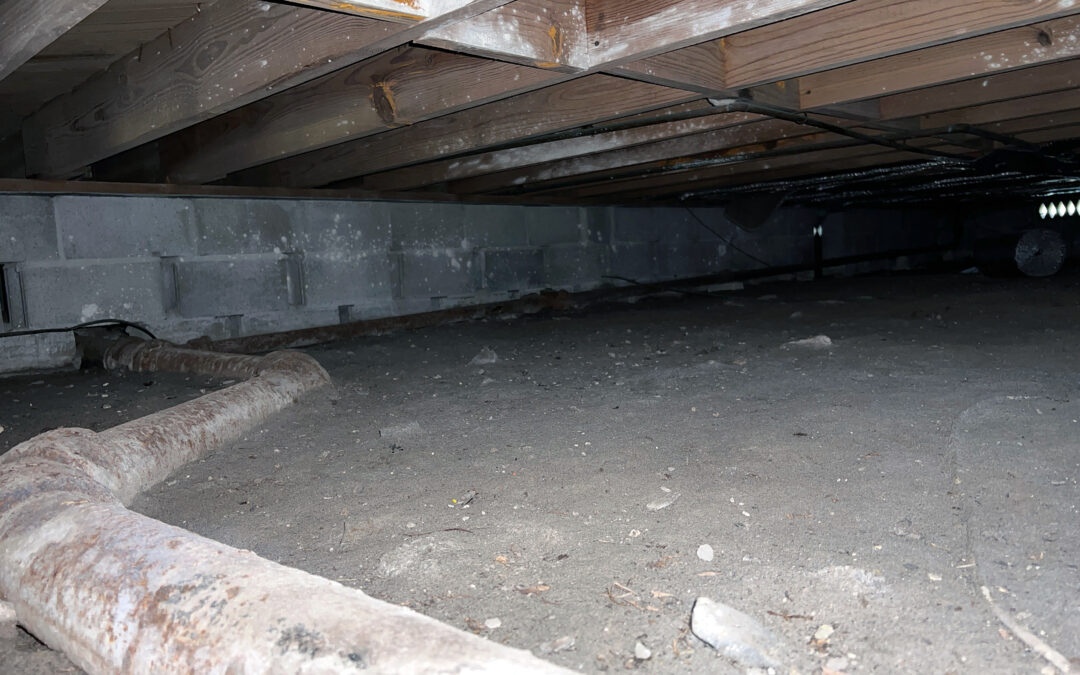What’s in your crawlspace stays in your crawlspace, right? No, and in fact, crawlspaces are the primary source of air quality issues in a home. The state of your crawlspace will impact the rest of your home, including how your home smells. Learn how moisture in your crawlspace could be impacting your living space and what to do about it.
How Musty Crawlspace Air Impacts Your Home
The air from your crawlspace could be contaminating the air in your living space. When excess water and moisture build up in your crawlspace, it creates high humidity. And when the air in your home is warm, the water vapors from your crawlspace will rise through your subflooring and flooring into your main living space.
That’s why on warmer days you might smell something musty in your home and be wondering where it is coming from. And as you search for signs of moisture, you likely don’t consider what’s lurking in your crawlspace.
A side effect you likely aren’t aware of with this humid air rising into your living space is that it is causing your heating and cooling costs. Once this air reaches your living environment, you’ll also be breathing in the mold, mildew and dust mites that can grow in your crawlspace thanks to the excess moisture your crawlspace is letting into your home.
If left untreated, moisture in your crawlspace could lead to wood rot, which could mean warped subflooring and expensive repair bills. These moist areas attract rodents, termites and carpenter ants, which further damage the foundation and integrity of homes.
Homes with fiberglass insulation also suffer when there’s excess moisture. This can cause the insulation to sag, which will leave your floors colder during the winter and can increase your heating bill.
Worst of all, allergy sufferers will see flare-ups during the winter months when allergies are generally at their most manageable levels. Dust mites can cause asthma attacks and moisture in crawlspaces is often to blame for indoor dust mites.
To summarize, the greatest risks to your home’s air due to moist crawlspaces include:
- Dust mites
- Mold
- Mildew
- Increased heating and cooling expenses
- Warped subflooring
- Pests
- Sagging insulation
Protecting Your Home’s Air with Crawlspace Maintenance
Controlling the moisture in your home and crawlspace is essential to keeping it a safe, enjoyable place to be. Preventing condensation from forming on your wood and never allowing mold or mildew to form will keep your home’s air safe and prevent nasty odors. Plus, you’ll avoid the big risks to your home’s foundation that excessive moisture can cause.
Follow these steps to cleaner air in your home.
- Seal any gaps in your home that might be allowing moisture inside.
- Work with a professional to remove any mold or mildew. Killing off these contaminants requires some extra know-how but once you’ve done away with them and sealed all gaps, you should be able to move to maintenance mode for your crawlspace.
- Clean and inspect your crawlspace. This involves sealing off dirt floors with a moisture retardant, which can also help prevent pests from making their way inside your crawlspace. You should clean your crawlspace at least once a year to remove dust buildup and other contaminants.
- Check for entry points for rodents and pests. Once your crawlspace is clean, you’ll be able to spot rodent entry points to seal off any additional cracks these animals were accessing your home through. You do want to ventilate your crawlspace though. Consider a water vapor barrier to keep pests out while still allowing water vapors to escape.
- Review your crawlspace insulation. Once you’ve cleaned up all mold and mildew in your crawlspace, you might find it’s time to replace or add insulation. A combination of fiberglass batts and spray foam can offer a tight seal to prevent heat transfer and keep your home feeling great. Spray foam helps fill even small cracks to make your home energy efficient. And moisture can’t get through spray foam, which means it will help prevent mold and mildew as well.
Columbia CrawlSpace offers repair, insulation and more to help you enjoy your home and prevent foundation issues. Call 931-2871 for more information.

Recent Comments